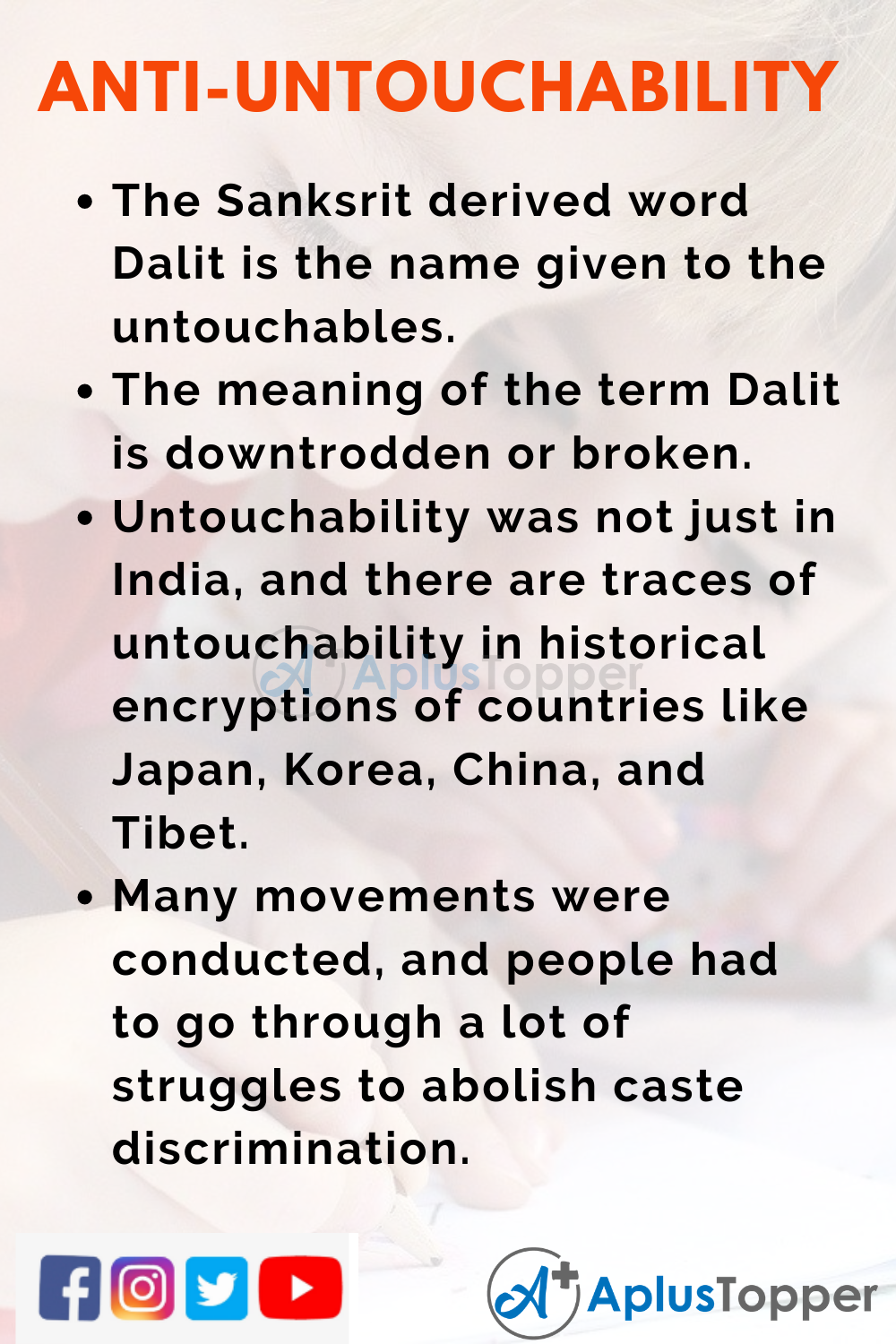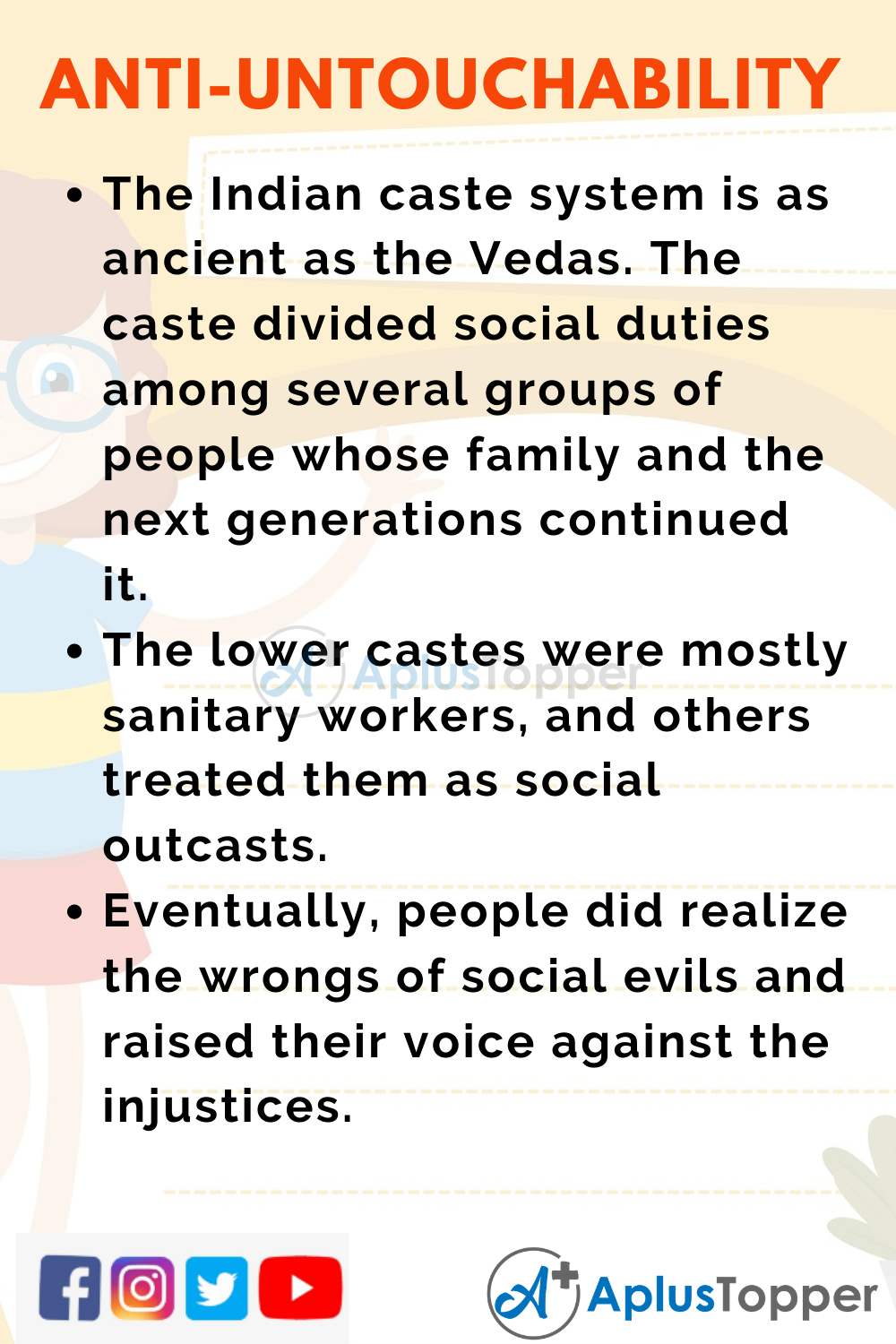10 Lines on Anti-Untouchability Week: The practice of discriminating against a specific group of people because of their caste is mostly called untouchability. One of the major social problems is untouchability, which was also very prominent in Indian society from ancient ages against the lower castes of the Hindu community.
The Indian caste system and social hierarchy were highly corrupted and oppressed by higher classes, giving rise to social evils like untouchability. Many social leaders struggled and rebelled against the injustice of untouchability and brought revolutionizing results, which is now commemorated as the Anti-Untouchability Week.
You can read more 10 Lines about articles, events, people, sports, technology many more.
Set 1 – 10 Lines on Anti-Untouchability Week for Kids
Set 1 is helpful for students of Classes 1, 2, 3, 4 and 5.
- The Sanksrit derived word Dalit is the name given to the untouchables.
- The meaning of the term Dalit is downtrodden or broken.
- Untouchability was not just in India, and there are traces of untouchability in historical encryptions of countries like Japan, Korea, China, and Tibet.
- Some evidence of untouchability still exists in our society, especially in rural areas.
- The Anti-Untouchability Week is observed from 2nd to 8th October of every year.
- In 2011, the Indian Parliament passed the law of the Anti-untouchability week celebration law.
- Untouchability is a social evil because every individual in society deserves to live with equality, respect, harmony, and brotherhood.
- Many movements were conducted, and people had to go through a lot of struggles to abolish caste discrimination.
- It was Mahatma Gandhi who re-named the Dalits as Harijans.
- The name or term Harijan means’ children of God.’

Set 2 – 10 Lines on Anti-Untouchability Week for School Children
Set 2 is helpful for students of Classes 6, 7 and 8.
- The Anti-Untouchability Week celebrations helped in bringing the attention of Indians to social problems and solve them.
- The government’s goal by the launching of this nationwide celebration was to ensure people become aware and actively protest against caste discrimination on witnessing it in their surroundings.
- The Indian government decided to use the Anti-Untouchable Week as a mode of persuasion to ignite the will in Indians of doing what is right and just.
- As Indians being loyal to our country and as civilized beings, we must bring a stop to all kinds of social evils.
- The caste system has already brought disgrace to India in-front of the world, and it is time all those knots of wrongs are untangled by doing the right.
- Rules that ruin people’s lives brings down society, and the only way to bring noticeable social development is by giving everyone an equal opportunity to succeed.
- The occurrences of disparity and injustice had risen tremendously when leaders like Mahatma Gandhi and B. R. Ambedkar came in to support and bring the lower caste their fundamental rights.
- When people can look beyond caste and can treat others equally, only then will a nation succeed.
- The Dalit civil society members were the ones who actively fought to bring justice, and for that, they organized national campaigns.
- Even though the people of society now claim to be very modern, there are still a few people who continue spreading the stigma of caste-based discrimination, and we must protest that.
Set 3 – 10 Lines on Anti-Untouchability Week for Higher School Students
Set 3 is helpful for students of Classes 9, 10, 11, 12 and Competitive Exams.
- The Indian caste system is as ancient as the Vedas. The caste divided social duties among several groups of people whose family and the next generations continued it.
- The lower castes were mostly sanitary workers, and others treated them as social outcasts.
- Eventually, people did realize the wrongs of social evils and raised their voice against the injustices.
- The week one of October(from 2nd to 8th) of every year is the Anti-Untouchability Week.
- Among the leaders who struggled for anti-untouchability, two most prominent leaders are Dr. B. R Ambedkar and Mahatma Gandhi.
- The motive behind the celebration of this week is to raise awareness among the people of society against caste-based discrimination.
- The Dalit earlier had a tough time surviving because of being socially isolated and stolen of fundamental rights like using the common source of water as others.
- After several years of living without being granted basic human rights and dignity, finally, with the help of revolutionizing leaders, there was a change.
- In May month of the year 2011, the Indian Government took an essential set of rules to bring an end to caste-based discrimination.
- The current social scenario of India is that several quotas are set for lower castes to get equal opportunities for education and jobs.

FAQ’s on 10 Lines on Anti-Untouchability Week
Question 1.
How did fighting for the rights of Dalit also contributed to the Indian Independence?
Answer:
Untouchability was a social disease that only divided the nation further. The only way the people would’ve gotten stronger against the British was fighting in a united way against their rule to bring freedom to India.
Question 2.
Which law of Indian constitution banished untouchability?
Answer:
Article 17 of the Indian Constitution abolished untouchability and any form of caste-based discrimination.
Question 3.
Who were the called the untouchables?
Answer:
The lower castes called the Schedule castes or Dalits were considered untouchable in Indian society.
Question 4.
Under which Prime minister was the Anti-Untouchability Week celebration declared?
Answer:
The Prime Minister of India in 2011 was Manmohan Singh.
